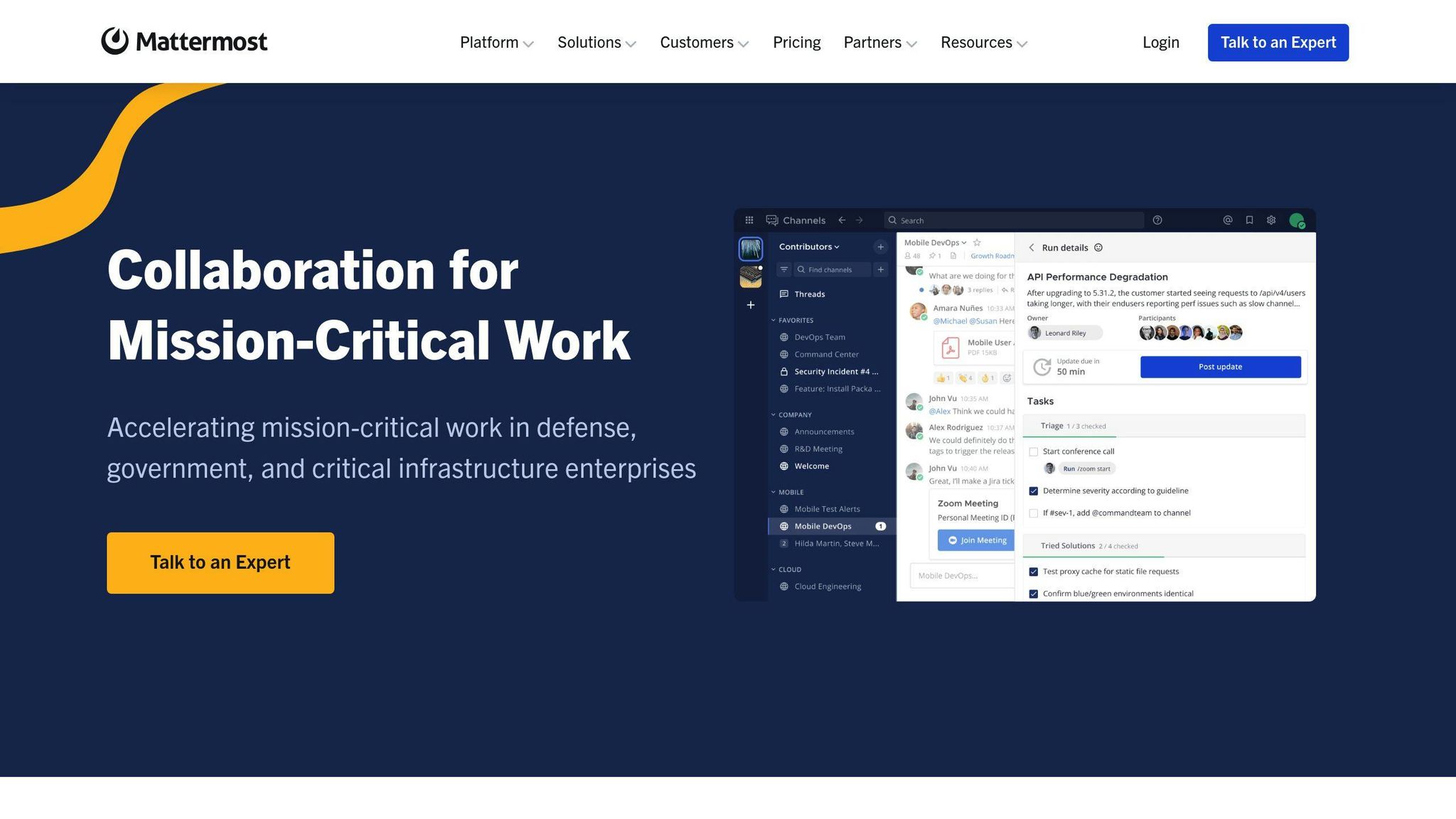Self-Hosted Chat Platforms: Complete Setup Guide
Self-hosted chat platforms like Mattermost, Rocket.Chat, and Zulip let you manage your data, customize features, and scale for your team's needs. Unlike tools like Slack, these platforms are cost-effective and perfect for organizations with strict security or compliance requirements.
Key Takeaways:
- Why Self-Host?: More control, better security, and no recurring fees.
-
Platform Choices:
- Mattermost: Best for large teams needing enterprise-grade security and integrations.
- Rocket.Chat: Ideal for flexible and customizable setups.
- Zulip: Great for structured, topic-based discussions.
- Setup Basics: Use Docker for easy installation, configure authentication (e.g., LDAP), and optimize performance with caching and load balancing.
- Security First: Enable 2FA, use role-based access, and ensure compliance (e.g., GDPR, HIPAA).
- Scaling Tips: Add application nodes, database replication, and monitoring tools like Prometheus.
Quick Comparison Table:
| Feature | Mattermost | Rocket.Chat | Zulip |
|---|---|---|---|
| Interface Style | Slack-like | Flexible | Topic-based threading |
| Integrations | Extensive (Jira, GitHub) | Moderate | Limited |
| Scalability | High (500+ users per node) | Moderate to high | Limited for large teams |
| Best For | Enterprise, regulated teams | Customizable team setups | Organized discussions |
Start by choosing the platform that fits your team's needs, then follow the setup and optimization steps to build a secure, scalable communication system.
How to Pick the Right Self-Hosted Chat Platform
Why Use a Self-Hosted Chat Platform
Self-hosted chat platforms give organizations more control over their communication systems. They’re especially useful for industries handling sensitive data or operating under strict regulations, as they ensure data stays within the organization. Plus, self-hosted options allow for a level of customization that most proprietary tools can't match. You can tweak the interface, add features, and integrate them seamlessly with your existing workflows. On top of that, they often save money by eliminating recurring subscription fees common with cloud-based tools.
With these advantages in mind, let’s see how Mattermost, Rocket.Chat, and Zulip compare.
Comparing Mattermost, Rocket.Chat, and Zulip

Each platform is built to meet different needs. Here's a quick breakdown of their features:
| Feature | Mattermost | Rocket.Chat | Zulip |
|---|---|---|---|
| Interface Style | Slack-like, minimal tweaks | Flexible, customizable | Topic-based threading |
| Message Organization | Traditional threads | Basic channels | Streams and topics |
| Integration Options | Extensive (Jira, GitHub, Trello) | Moderate selection | Limited but focused |
| Enterprise Features | Advanced security and compliance | LDAP/AD, 2FA | Basic enterprise tools |
| Notification Control | Channel and global settings | Standard options | Topic-level granularity |
Mattermost offers a Slack-like interface, making it easy for teams to transition, and is packed with enterprise-level security and integration options. Rocket.Chat shines when it comes to flexibility and customization, making it a great choice for teams that need a tailored solution. Zulip, on the other hand, focuses on organized discussions through its unique topic-based threading.
What to Consider When Choosing a Platform
When deciding on the best self-hosted chat platform, keep these factors in mind:
Technical Requirements and Resources: Look at your team’s expertise and the infrastructure you have available. Mattermost often requires more robust hosting but delivers strong stability. Rocket.Chat works on lighter systems but may trade off some performance.
Scalability: Think about your organization’s growth. Mattermost is built to handle large-scale deployments with thousands of users, while Rocket.Chat can scale effectively but might need extra optimization for very large setups.
Integration Needs: Check how well the platform connects with your existing tools. For example, if your team relies heavily on DevOps tools, Mattermost’s broad integration options could be essential. For simpler setups, Zulip’s focused integrations might be enough.
User Preferences: Consider how your team communicates. If they prefer organized, topic-driven discussions, Zulip could be the best fit. For teams used to Slack, Mattermost’s similar interface might make adoption smoother.
After choosing the right platform, the next step is setting it up and tailoring it to your team’s needs.
Build Self Hosted Private Chat Server with Rocket.Chat
Step-by-Step Guide to Setting Up
Getting your communication system up and running starts with proper installation and configuration. Here's a clear guide to help you through the process.
How to Install a Self-Hosted Chat Platform
Before diving into the installation, ensure your server meets the necessary requirements:
| Platform | Minimum Server Specs | Recommended OS | Key Dependencies |
|---|---|---|---|
| Mattermost | 4GB RAM, 2 CPU cores | Ubuntu 20.04+ | PostgreSQL, Docker |
| Rocket.Chat | 2GB RAM, 1 CPU core | CentOS 7/8 | MongoDB, NodeJS |
| Zulip | 2GB RAM, 2 CPU cores | Ubuntu 20.04+ | PostgreSQL, Python 3.8+ |
For a Docker deployment, follow these steps:
-
Install Docker using your system's package manager (e.g.,
apt-get install docker-ceon Ubuntu). - Install Docker Compose by referring to its official documentation.
-
Download the platform's
docker-compose.ymlfile. - Set up the required environment variables.
-
Launch the platform using
docker-compose up -d.
Once installed, you can move on to customizing the platform to suit your team's needs.
Setting Up the Platform for Your Team
After installation, it's time to configure the platform to work effectively for your team. Focus on these key areas:
User Management and Authentication
- Set up enterprise-wide authentication, such as LDAP or Active Directory.
- Enable two-factor authentication for added security.
- Define role-based permissions to manage access levels.
Channel Organization
Structure communication channels to align with your team's workflow. For example:
- Use channels for Mattermost or Rocket.Chat.
- Use streams and topics for Zulip.
Tips for Improving Performance
To ensure smooth operation, optimize your platform's performance with these strategies:
Database and Storage
- Schedule regular database maintenance to keep things running efficiently.
- Use external storage for media files to save local resources.
- Implement retention policies to manage storage effectively.
System Performance
- Set up Redis caching to speed up message delivery.
- Use Nginx as a reverse proxy to handle traffic efficiently.
- Implement a CDN for serving static assets.
For teams with more than 500 users, consider scaling your setup to maintain reliability. This can include:
- Adding multiple application nodes.
- Setting up database replication.
- Using load balancing to distribute traffic evenly.
sbb-itb-ae976f1
How to Secure and Scale Your Platform
Best Practices for Security
Security is a must-have for any self-hosted chat platform. Start by setting up strong protection measures, layering security features, and fine-tuning configurations to keep your data safe.
Key Security Settings
Platforms like Mattermost and Rocket.Chat offer end-to-end encryption to safeguard messages both in transit and at rest. Make sure to enable these options in the security settings of your platform.
Here’s how you can add multiple layers of protection:
| Security Layer | How to Implement | Why It Matters |
|---|---|---|
| Two-Factor Authentication | Use Google Authenticator integration | Adds an extra layer of protection, even if passwords are compromised |
| Role-Based Access | Assign roles like Team Admin, Channel Admin, and Member | Ensures users only access data relevant to their role |
| Single Sign-On (SSO) | Integrate with LDAP/Active Directory | Simplifies authentication and streamlines user management |
For organizations needing compliance, Mattermost supports GDPR and HIPAA standards, making it ideal for healthcare and European-based teams. Regular security audits and detailed logging of system changes are also crucial for maintaining a secure environment.
Once your platform is secure, it’s time to prep it for growth.
Scaling the Platform for Growth
As your team grows, your platform needs to keep up with rising traffic and user demands. Scaling ensures your system remains stable and efficient as usage increases.
Managing Infrastructure and Resources
Monitoring is key to scaling effectively. Mattermost comes with built-in monitoring tools, while Rocket.Chat integrates well with Prometheus and Grafana for deeper insights.
To prepare your platform for growth:
- Set up database replication to balance the load across servers.
- For larger teams (500+ users), deploy multiple nodes with at least 8GB RAM per node.
- Keep your platform updated to fix vulnerabilities and improve performance.
When using monitoring tools, focus on these metrics:
- Message delivery time and latency
- Database health and performance
- System resource usage
- How well the platform handles multiple users at once
Tracking these metrics will help you pinpoint issues early and make the necessary infrastructure upgrades to support your growing team.
Summary Table and Final Recommendations
Here's a comparison of these platforms to help you decide:
| Feature | Mattermost | Rocket.Chat | Zulip |
|---|---|---|---|
| Key Strengths | Enterprise-grade security, many integrations | Deep customization, flexible setup | Topic-based threading, organized communication |
| Best For | Large organizations, regulated industries | Teams needing customization | Projects focused on structured discussions |
| Security | GDPR/HIPAA compliance, MFA, SSO | LDAP/AD integration, 2FA | Basic security tools |
| Scalability | High (500+ users per node) | Moderate to High | Limited for large teams |
| Integration Support | Extensive (Jira, GitHub, Trello) | Moderate | Limited but solid bot support |
| Message Organization | Traditional threads | Linear conversations | Unique topic-based threading |
| UI Customization | Limited but polished | Highly flexible | Minimal customization options |
Platform Insights
- Mattermost: Ideal for organizations that need strong security features, numerous integrations, and the ability to scale for large teams.
- Rocket.Chat: A great fit for teams seeking flexibility in deployment and highly customizable features.
- Zulip: Best for teams that value structured, topic-based discussions and detailed notification controls.
Implementation Guidelines
For teams with more than 500 users, ensure your setup includes 8GB+ RAM, 4+ CPU cores, and a replicated database for smooth performance. While these platforms can be tailored to your needs, their architecture influences communication styles. Choose based on your long-term goals and specific use cases, not just your immediate requirements.
Conclusion
Setting up a self-hosted chat platform gives you greater control over team communication. Each platform has its own strengths - Mattermost focuses on security and scalability, Rocket.Chat excels in customization, and Zulip is ideal for structured discussions. Choosing the right platform depends on aligning its features with your team's specific needs.
The platform's design plays a big role in shaping how your team interacts. After deciding on a platform, here are a few essential steps to keep in mind:
- Strengthen security: Use multi-factor authentication, set clear permissions, and establish strong security measures.
- Optimize performance: For larger teams, ensure your server has at least 8GB of RAM and 4 CPU cores for smooth operation.
- Integrate tools: Add integrations to simplify workflows and improve efficiency.
This guide provides the foundation to confidently set up and manage a self-hosted chat platform tailored to your team. Keeping the system updated and regularly monitored will ensure it remains secure, efficient, and in tune with your team’s evolving needs.
While setting up a self-hosted platform takes careful planning, testing, and ongoing maintenance, the payoff is worth it. You gain better data protection, customized features, and full control over your communication system. A well-maintained platform can truly elevate how your team collaborates.








































